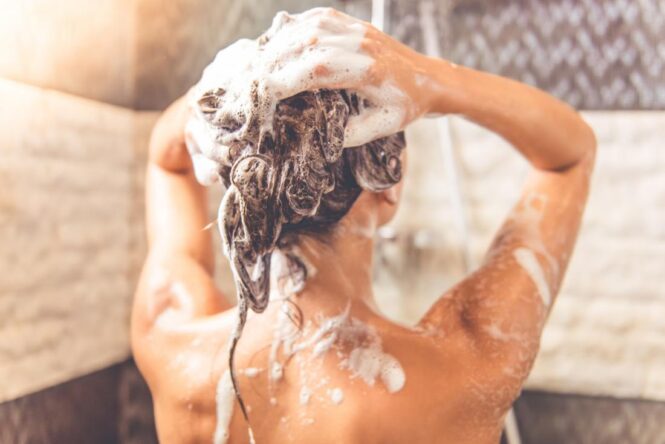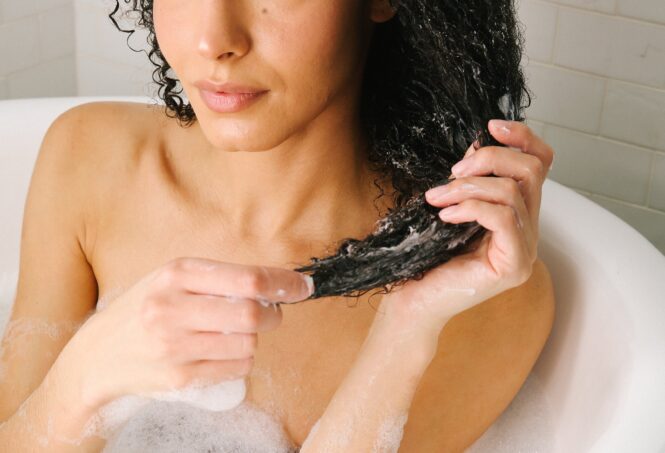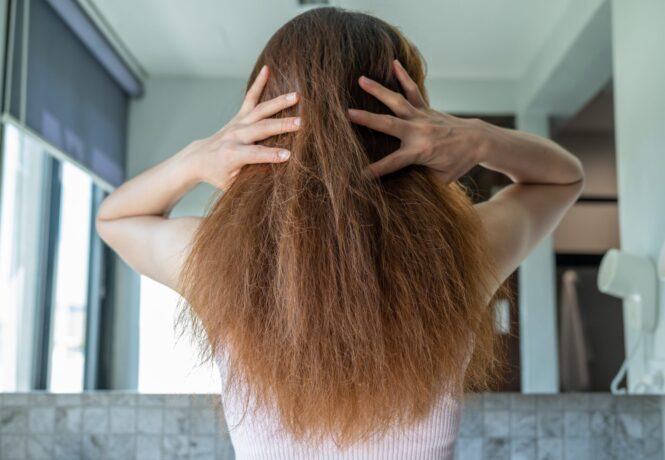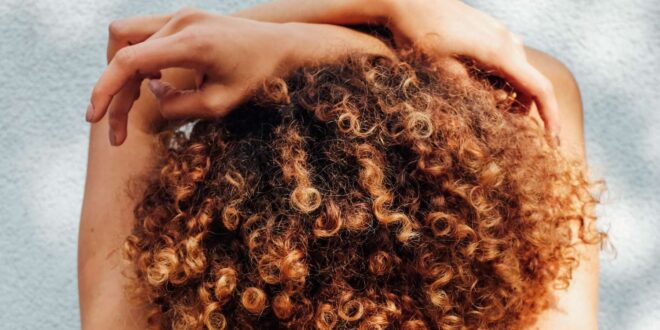Ah, curly hair – a mesmerizing dance of twists, turns, and bounce! But behind that eye-catching cascade lies a genuine query: How often should those curls meet the lather? Delve with us into the intricacies of curly hair care.
The Science Behind Curly Hair
It’s not just about aesthetics; there’s a whole science behind those spirals. Hair follicle shape, typically oval or asymmetrical, leads to those unique patterns. Yet, this very structure causes natural scalp oils to take a detour, often leaving curls thirsting for moisture. Revlon Professional products take curly hair to the next level of healthiness!
- Deciphering the Washing Code: Factors at Play
- Scalp Dynamics: Not all scalps are created equal. A more oily scalp might beckon for more regular washes than its drier counterpart.
- The Curl Spectrum: From gentle waves to tight ringlets, the type of curl can dictate its washing needs.
- Porosity and Hair: High porosity means your hair can absorb moisture like a sponge, but it can also lose it just as quickly.
- Lifestyle Choices: Athletes, beach-goers, or those exposed to daily environmental pollutants might need to refresh their locks more often.
Dangers Lurking in Over-Washing

- Natural Oil Depletion: Excessive washing can rob the hair of its protective oil mantle.
- Itchy Affairs: A dry scalp can lead to uncomfortable itching and even unsightly dandruff.
- Curl Deflation: Too much washing can cause curls to lose their springy nature.
- Frizz Fest: Stripping hair too often can lead to the dreaded frizz.
Striking the Right Washing Balance
- Coily and Very Curly Types: Consider washing once a week or even stretching it to 10 days.
- Wavy to Medium Curls: A twice-a-week or every third day routine might work wonders.
- Active Beings: A mix of water rinses and mild shampooing spaced out during the week can strike the right balance.
The Co-Washing Revolution

Moving beyond traditional shampooing, co-washing – using conditioners to cleanse – preserves natural oils while still refreshing the scalp. Especially suited for curly mavens, it’s a game-changer in hair care.
Golden Rules for Curly Wash Days
Product Selection: Lean towards sulfate-free shampoos and silicone-free conditioners.
Moisture Boost: Every couple of weeks, treat your hair to a deep-conditioning session.
Cool It Down: Rinse with cooler water temperatures to lock in moisture and shine.
Gentle Drying: Say goodbye to rigorous towel drying. A gentle scrunch with microfiber or cotton retains curl shape.
Tuning into Your Hair’s Signals
Understanding one’s hair is akin to understanding a unique language. While a seasoned hair stylist may be adept at decoding general hair concerns, the intimate relationship you have with your locks makes you the ultimate interpreter of its needs. Let’s explore how to tune into these signals and what they might be saying.
Recognizing the Signals:

- Dryness: One of the most common signs, especially for curly hair, is the feeling of dryness. This isn’t just about texture; it’s about the hair’s health. Dry hair can become brittle, leading to breakage. If your curls are losing their shine or feel rough to the touch, they’re sending out an SOS for hydration.
- Limpness: Lively curls that suddenly seem limp and lifeless can be concerning. This could be an indication that your hair is over-moisturized, also known as ‘hygral fatigue.’ Limp curls might be a sign that it’s time to cut back on deep conditioning treatments or to integrate protein treatments into your regimen.
- Buildup: If your hair feels weighed down, greasy even after washing, or if you notice flakes on your scalp, it could mean there’s buildup. This can arise from overusing hair products, infrequent washing, or using products that don’t suit your hair type.
Taking Proactive Steps:
- For Dryness: Consider integrating a leave-in conditioner or hydrating serum into your routine. Also, ensure you’re not washing your curls too often, which can strip them of essential oils. Deep conditioning treatments can also help reintroduce moisture.
- For Limpness: Evaluate your product stash. Ensure you’re not overloading on heavy conditioners or creams. Instead, look for lightweight products, and consider doing protein treatments to restore hair strength.
- For Buildup: Introduce a clarifying shampoo into your routine, but use it sparingly – perhaps once a month or when you feel there’s significant buildup. Regular scalp massages can also promote circulation and help distribute natural oils, preventing buildup.
Cultivating a Listening Mindset:

Understanding your hair requires patience, observation, and willingness to adapt. As seasons change, so might your hair’s needs. Always keep a keen eye on any changes in your hair’s texture, appearance, or feel.
Furthermore, don’t hesitate to consult with a hair professional if you’re unsure. While you are the primary expert on your hair, a fresh perspective can sometimes offer insights you might have missed.
FAQs
Can I use dry shampoo for my curly hair between washes?
Absolutely! Dry shampoo can be a lifesaver for curly-haired individuals looking to refresh their locks without a full wash. Ensure you choose a product formulated for curly hair to maintain its texture and moisture levels.
Should I detangle my curly hair before or after washing?
It’s usually best to detangle curly hair while it’s wet and conditioned, as this can minimize breakage. Using a wide-tooth comb or your fingers while the conditioner is still in your hair will allow for easier and gentler detangling.
Can I wash curly hair with just water?
Yes, sometimes referred to as “water-washing,” this method can help refresh your curls without stripping them of natural oils. However, it’s essential to occasionally cleanse the scalp and hair thoroughly to avoid product buildup.
Are there any specific ingredients I should avoid in shampoos for curly hair?
Indeed, it’s best to avoid shampoos with sulfates, as they can be too harsh and drying for curly hair. Additionally, be wary of alcohols which can dry out your curls, and silicones that might cause buildup if not thoroughly rinsed out.
How can I maintain my scalp health without frequent washing?
Massaging your scalp regularly can help distribute natural oils and increase blood flow. Additionally, consider using lightweight oils like jojoba or argan oil to maintain a balanced and moisturized scalp.
I have a mix of curly and wavy hair; how should I approach washing?
Many people have mixed hair textures. It’s essential to strike a balance. You might consider co-washing more often, focusing on the curlier parts while ensuring that wavier sections don’t get weighed down. Adjust your routine based on how each section of your hair responds.
Wrapping Up
In the realm of curly hair care, the ‘how often to wash’ debate finds its answer in a mix of science, personal lifestyle, and, most importantly, intuition.
By recognizing and respecting the unique nature of your curls and adjusting your care routine accordingly, you’re set on a path to flaunting healthy, vibrant curls that not only look good but also feel fantastic!
 Imagup General Magazine 2024
Imagup General Magazine 2024



